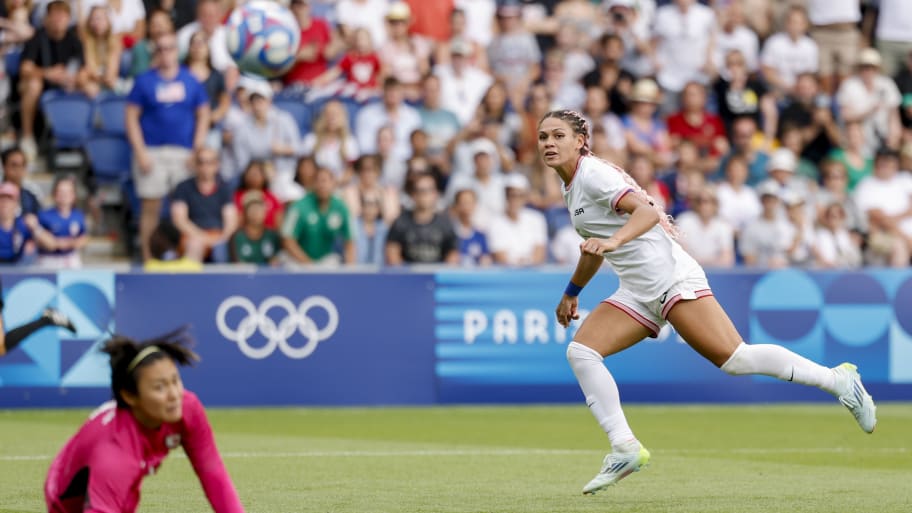
Trinity Rodman leaped into her teammate Emily Fox’s arms with utter relief strewn across her face. After over 105 minutes of sluggish and torpid play Saturday afternoon in Paris, Rodman’s masterpiece of a finish lifted the U.S. women’s national soccer team to a 1–0 win over Japan. Gathering a long ball over the top from outside back Crystal Dunn, Rodman charged into the box before cutting back to her left foot, curling a stunning shot past the Japan goalkeeper to secure a quarterfinal win for the U.S.
TRINITY RODMAN TAKE A BOW. 👏
— NBC Olympics & Paralympics (@NBCOlympics) August 3, 2024
THAT IS ABSOLUTELY STUNNING. THE USWNT LEADS IN EXTRA TIME.#ParisOlympics | 📺 USA and Peacock pic.twitter.com/rNlebzAyOo
The extra-time go-ahead goal jolted an increasingly impatient Parc des Princes crowd awake, with former USWNT stars Megan Rapinoe and Mia Hamm on hand to watch the Americans stamp their ticket to the Olympic semifinals.
Of the many takeaways from this match, coach Emma Hayes now knows her side can win ugly against a familiar foe, a valuable skill in an unforgiving tournament like the Olympics. Other lessons, however, may prove trickier to contend with as the USWNT fights for a spot on the podium in Paris.
A dependable back line
Let's start with the positives: Another game, another clean sheet for the USWNT defense, helmed by a sensational Naomi Girma. In the opening half, Girma completed 105 passes, according to OptaJack, the most by any player in a major tournament since 2011, when the outlet began collecting data. The 24-year-old was a bright spot during an otherwise monotonous matchup, quieting a Japan attack that can be dangerous on the counter. Fellow center back Emily Sonnett deserves her flowers too, with the veteran stepping up for an injured Tierna Davidson (who is sidelined by a bone contusion that she picked up in the group stage), holding a clinical Japan side scoreless.
While the USWNT attack has shown itself to be lethal, it's important that against a compact setup like Japan’s, Girma & Co. can be relied upon to keep the U.S. in the game.
Middling midfield
It wasn’t the U.S. midfield’s best day. The smothering humidity of Marseilles appeared to follow the USWNT to Paris as Lindsay Horan, Rose Lavelle and Korbin Albert went up against an unrelenting and low Japanese block, in what was the trio’s second appearance together. With starting defensive midfielder Sam Coffey out due to card accumulation—picking up yellow cards against Germany and Australia in the group stage—Hayes had to rely on a relatively inexperienced Albert to anchor the center of the pitch. In theory, having Albert take over defensive responsibilities would unlock Horan, pushing her up the field, but facing a prudent Japan defense, there were very few opportunities to get in behind. Japan also successfully clogged up the center of the park, pouncing on costly turnovers to spur its attack.
The good news is the USWNT will have Coffey back for Tuesday's semifinal game against Germany, rejuvenating a fatigued midfield. Hayes will likely look for more than just rest from her midfield group though, with the hope that Coffey’s presence will free up Lavelle, allowing her to link with the forward line in the final third.
To sub or not to sub?
Hayes seemed to double down on her decision to utilize her bench sparingly, going with the same starters from the three group stage matches, save for injuries. As a result, the squad appeared bogged down by heavy legs, missing connections and committing heavy touches.
Standing by her approach to build chemistry between her starters, Hayes didn’t make a change until the 91st minute, when Lynn Wiliams came on for Mallory Swanson. She made two more substitutes in extra time as Lavelle made way for Jenna Nighswonger in the 106th minute and Casey Krueger replaced Fox in the 120th.
How will Hayes’s players fare after more than 120 minutes of action and only two days of rest? That will be a talking point for the remainder of the tournament, as she will surely rely on her preferred starting group with medals on the line.
The USWNT will make the trip back to the South of France to face Germany, an opponent that also comes with its own unique challenges, histories and story lines. Hayes has made it clear that the U.S. takes no team for granted.
“I think one of the biggest problems is too often we keep talking about what we’re going to do in Paris, or what happens when you get to the semis or the finals,” Hayes said ahead of the Summer Games. “I think it’s disrespectful to the rest of the world to talk like that. And I think that the game has moved to a point where that isn’t the case. It isn’t a shoo-in to get somewhere. It has to be earned …”
Hayes’s side has earned its spot in the semifinals, no question. The U.S., after back-to-back disappointing major tournaments, has also earned back some respect. While it hasn’t won anything yet, the USWNT has put together a string of quality performances, and, critically, against Japan, gutted out an unsightly win.
This article was originally published on www.si.com as USWNT Outlasts Japan, Sets Sights on Olympic Redemption .







